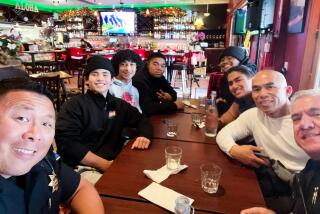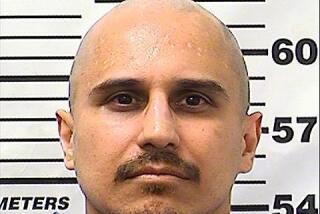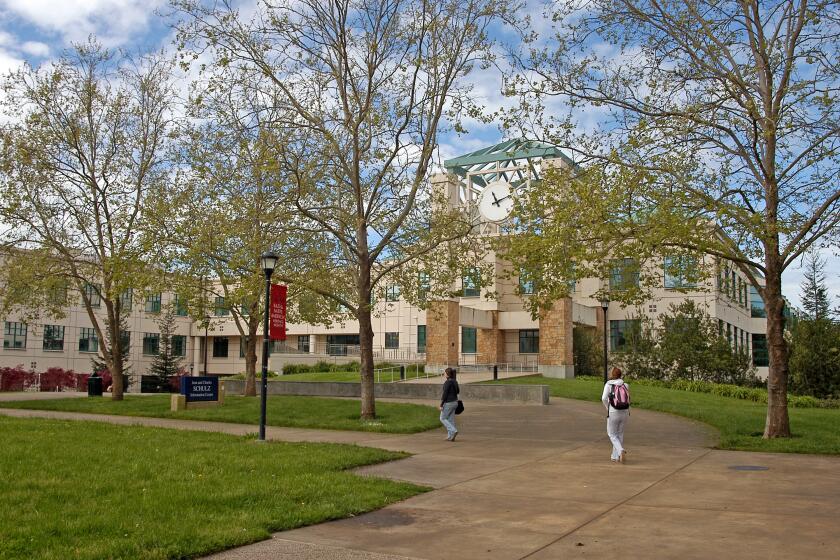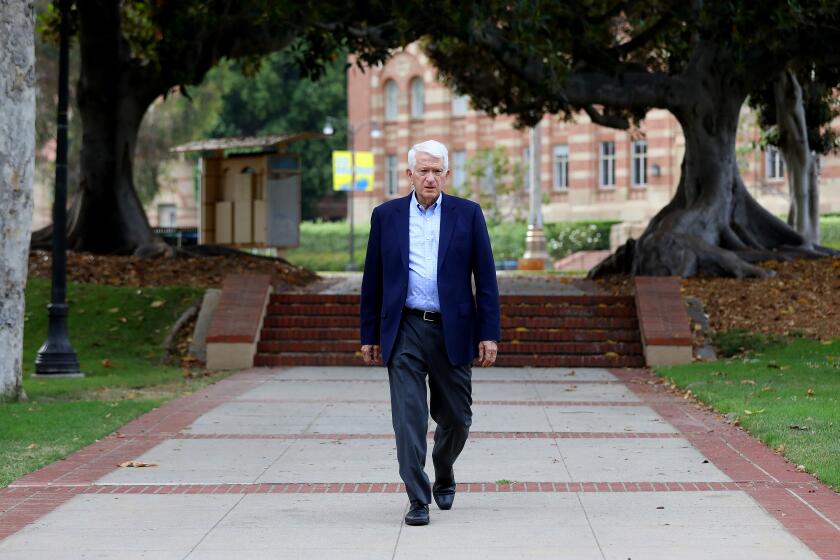Law School Undertakes Quest to Upgrade Image : New Dean Spearheads Effort at California Western : to Banish Effects of Instability, Reputation Eclipse
Attorney Michael Crowley remembers it as one of the more irksome episodes he has ever endured.
The year was 1982, and Crowley, midway through his studies at California Western School of Law, was looking to land a summer clerkship with a prestigious legal firm in town. He had good grades, the endorsements of his professors, even a coveted position on the school’s law review.
But when Crowley applied to Higgs Fletcher & Mack, one of the oldest and most respected firms in San Diego, he was rejected, sight unseen. The reason?
He went to the wrong law school.
Found Situation Egregious
“They told me they only retain law clerks who they meet in on-campus interviews, and since they didn’t interview at Cal Western, I was out of luck,” recalled Crowley, whose anger grew when he learned the firm’s founding partner was a Cal Western graduate and member of the school’s board of trustees. “I found it appalling, really egregious. Maybe I wasn’t qualified, but I at least deserved a shot at it.”
Though the experience was humiliating, Crowley quickly rebounded, going on to become a successful attorney. Now his alma mater--plagued in recent years by declining enrollment, financial instability and a reputation eclipsed in the 1970s by its much younger cross-town rival, the law school at University of San Diego--is staging a comeback of its own.
Under the leadership of a new dean fresh from the business world, California Western in the last 18 months has launched a bevy of contemporary law programs, stepped up recruitment of students, initiated an aggressive fund-raising campaign and orchestrated a marketing strategy aimed at boosting its image both locally and nationwide.
Combining enthusiasm with business acumen gained from 12 years in private industry, Dean Michael Dessent has taken a school described by one faculty member as “academically sound but simply overlooked or dismissed by most people” and steered it on a course some boosters predict could win it an international reputation for excellence.
‘Real Tough Times’
“I think it’s on the threshold of some very, very big things,” said James Lorenz, former U.S. attorney and a 1965 graduate of Cal Western. “It went through some real tough times, some events that were nearly disastrous. But now it has reached the highest plateau it has ever achieved and I believe it will continue to make a solid name for itself not only locally but nationally and internationally as well.”
Faculty and supporters say the revitalization effort at the law school, housed in a former Elks Lodge on the edge of downtown, already is paying dividends:
Applications have more than doubled over the last year, prompting an attendant increase in the academic credentials of entering students. School officials attribute the surge to a slick promotional video produced shortly after Dessent’s arrival and the dean’s habit of traveling to scores of colleges annually to personally recruit prospective law students.
Fund raising, historically a laissez-faire activity at the school, has reached an all-time high, with $650,000 in contributions taken in over the past year. In 1985, $7,000 was raised.
Career opportunities have brightened as well. The number of law firms that conduct on-campus interviews of graduating students has increased from eight in 1985 to 44 this year. Lawyers in charge of hiring for several large firms in San Diego say Cal Western’s reputation is improving steadily and note that its graduates are particularly well equipped with the basic skills of lawyering.
Known for its emphasis on practical training, Cal Western last year defeated a host of the country’s most prestigious law schools to win the national championship in the American Bar Assn.’s mock trial competition--the first time any school west of Texas has done so. Last weekend the school edged UCLA and 10 other law schools to win the western regionals in a similar competition. Cal Western has been a finalist in the national championships in that competition three times in the last four years.
Finally, Cal Western officials say the school is measuring up better against USD’s law school, which, in the last decade or so, has drawn higher marks in the local legal community. While four out of five students admitted to both schools selected USD in 1980, the choice is a tossup today, Cal Western’s statistics show.
Problems Remain
Despite such gains, problems remain, and most observers say Cal Western’s reputation still lags behind that of USD, the only other San Diego law school accredited by the American Bar Assn.
Cal Western’s “bar passage rate”--the percentage of graduates who pass the bar exam the first time they take it--was seven points below the state average and six points below USD’s rate on the test administered in the summer of 1986.
While the school’s graduates can be found in numerous courtrooms, foreign embassies and government agencies, they are comparatively few among the ranks of the top local law firms--an irony considering Cal Western, founded in 1924, is the city’s oldest law school. The three largest firms in town--Gray Cary Ames & Frye, Luce Forward Hamilton & Scripps and Higgs Fletcher & Mack--do not conduct on-campus interviews of graduating students at Cal Western, though two of the three do so at USD.
And, although a new fund-raising campaign has begun to tap the wallets of alumni, the school as yet has no endowment, leaving it in a precarious position should a dip in enrollment or other financial shock strike.
Neither Dean Dessent nor faculty members deny the lingering problems. But they appear to have no doubts that virtually any obstacle can be overcome.
“When I got here the school was in many ways just drifting,” said Dessent, 45, who was vice president and general counsel for the Price Co. before taking the helm at Cal Western on April 1, 1986. “I think it needed a new impetus and, hopefully, I’m giving it that.”
Housed in a historic, high-ceilinged building constructed in 1929 on Cedar Street, California Western has a chaotic past that began with its birth as Balboa University Law School 63 years ago. In 1954, the school closed, reopening in 1960 under the wing of California Western University.
Robert Castetter, who took over as dean that year, recalls the number of students rose from 11 the first day to 21 by the term’s end. (Enrollment is now 560.) “We were a small, intimate group,” said Castetter, who was dean until 1980 and retired as president in 1986. “My boys and I would have our general assemblies in the hallway or lobby.”
In those days, the school was situated along with the parent university on a spectacular blufftop site in Point Loma. In 1973, the campus was sold to the Church of the Nazarene, and Cal Western University moved to Scripps Ranch where it became United States International University.
Concerned that the university’s severe financial woes might cause it to fold, Castetter and his faculty decided to secede from USIU, a deed they accomplished only by inheriting the university’s $2-million debt. In June, 1975, California Western School of Law declared itself independent and moved to the location it occupies today.
The divorce from USIU was painful, fraught with fears of financial ruin and the menu of other problems accompanying the establishment of a free-standing law school. Only 16 such schools exist in the nation.
Difficulties Recalled
“It was a very difficult move,” recalled Castetter. “There are obviously a lot of emotional ties and suddenly we were without the great deal of support provided by a university. We had to make sure we were financially self-sufficient each year. There were many entirely new challenges.”
According to professors who joined the faculty soon after the split, the financial stress of the move damaged both the school’s reputation and the quality of its students.
“Money was a big concern, naturally, so they took in a lot more students--too many students, I’d say--and when you do that, you get students whose qualifications might not be up to par,” recalled William Lynch, a 10-year faculty member who teaches torts and evidence. “That encourages other students with marginal qualifications to apply, and it’s a cyclical thing that is not easy to break.”
Although he denies that the quality of the student body suffered, Castetter concedes those years caused a sense of “uneasiness and uncertainty” among students and faculty that hurt Cal Western’s image.
“No institution has an even-keel development over 20, 30, or 40 years, and our financial difficulties and the unsettled feeling about where the campus was going to be created a little tension,” Castetter said. “Word about that gets out and we have had to contend with that.”
Meanwhile, USD was flourishing under the direction of Dean Donald Weckstein, who took advantage of an increase in law school applicants to boost enrollment, tighten admissions standards and woo some heavyweight legal scholars to the faculty, which doubled in size during his nine-year tenure beginning in 1972.
“When I arrived, the schools rated about equally,” said Weckstein, who still teaches at USD. “I was able to take advantage of a period of tremendous growth in legal education to make qualitative and quantitative improvements at USD. I think Cal Western was prevented from doing so by the financial problems of (its mother) university.”
USD’s ability to “attract some really distinguished scholars,” Weckstein observed, has enabled it to “do a little better in recruitment and placement” of graduates.
In 1980, a new dean--Ernest Friesen, a renowned expert on judicial administration--started a new era for Cal Western.
During Friesen’s six-year tenure, school officials attempted to merge with UC San Diego, a three-year effort they finally abandoned in 1984 out of impatience with the UC Board of Regents’ delay in acting on their proposal.
“That was a disappointment, definitely,” said Michael O’Keefe, a professor of tax law at Cal Western since 1978. “It would have meant a huge jump in stature for us overnight. It was a turning point.”
At the same time, the number of law school applicants nationally had fallen 20%, a dip that hit Cal Western particularly hard, causing total enrollment to decline from about 700 students to a low of 450.
In an attempt to stay afloat, Cal Western began appealing to a broader audience, specifically older students entering law as a second career. Friesen instituted a program allowing students to complete their degree program in two years and another establishing a January enrollment date. He also revamped the school’s academic structure, instituting more trial practice courses, enhanced the student internship program, beefed up recruitment and expanded the library from 70,000 to 180,000 volumes.
Robert Cane, a San Diego attorney who resigned as associate dean shortly after Dessent took over, credits Friesen with laying the groundwork that is paying off for Cal Western today: “I think we did a lot to modernize the school, make it more attractive to students and set the stage for Dessent’s arrival,” Cane said.
That day came on April 1, 1986--April Fools’ Day, Dessent observes wryly. But what the new dean found was not a joke.
“Fund raising and recruitment were non-existent,” he recalled, “and we had a $100,000 debt because some students hadn’t paid their tuition . . . . Our building is lovely and historic, but it badly needed repairs. And the alumni--there are 3,000 of them around the world--weren’t involved in the school at all.”
Video Caused Stir
The first thing Dessent did was make a 15-minute video to use as a promotional tool. Blending interviews with prominent graduates, aerial beach shots and footage of surfers and bikini-clad sunbathers, the video cost $25,000 to make and was more than a little controversial.
“This was sheer heresy, something nobody had ever dared do before,” Dessent said. “But I figured if we wanted people to come here, we had to show them what it was like.”
Along similar lines, Dessent decided that instead of sending an admissions officer on the annual recruitment pilgrimage, he would go himself--taking the extra step to convince students Cal Western wanted them.
“I traveled 120,000 miles to 175 different schools last year,” Dessent recalled recently, taking a break between visits to the University of Nevada at Las Vegas and Brigham Young University. “It worked. Applications went nuts, from 1,200 to 2,850 in a year.”
That allowed Cal Western to be more selective in its admissions procedures. This year, for example, students’ scores on law school entrance exams were up 10%.
Meanwhile, Dessent began collecting on delinquent tuition accounts and knocking on alumni doors. In four months, nearly all of the debt was erased. Fund raising soared and a special campaign to fund a new state-of-the art classroom already has covered 60% of the project’s costs.
“We’ve got some high-powered alumni around, but nobody ever asked them for anything,” Dessent said.
On another front, Dessent decided to increase the school’s community outreach effort, in part to help end the aggravating public confusion that exists over Cal Western and Western State University School of Law--an unaccredited institution overlooking the freeway in Old Town.
In recent months, Cal Western has coordinated programs on issues ranging from sports and entertainment law to the legal questions surrounding biotechnology and women’s property rights. A $400,000 grant enabled the establishment of a telecommunications law center that presents special seminars and student courses. Dessent hopes the center will earn Cal Western a national reputation in that area of study.
Those affiliated with the school appear completely won over by Dessent as well as convinced his leadership will take Cal Western to new heights. When discussing the school, administrators and faculty mark time in terms of “before Mike” and “after Mike,” and they express unmitigated enthusiasm and loyalty for the dynamic dean.
But whether that internal momentum and excitement has captivated the legal community at large is far less clear.
“Mike has certainly been very aggressive in marketing the school to potential employers and we’ve learned a lot more about it than we ever knew before,” said Don Rushing, chairman of the recruiting committee at Gray Cary Ames & Frye, which has one Cal Western graduate and 13 USD graduates on a staff of more than 160 lawyers. “But we traditionally hire from schools where we’ve hired from before and we haven’t hired much from there. It’s a sticky chicken-and-egg situation.”
Moreover, some observers are skeptical of just what Cal Western can accomplish as a private, independent law school lacking the stature, protection and fund-raising apparatus that come with association with a mother university. A private law school, they say, will always have trouble competing for students, particularly in an era when the number of applications to schools nationally is on the decline.
“Being independent is an advantage in some respects, because you can be creative and flexible and operate outside a cumbersome bureaucracy,” said John Alcock, an attorney with Gray, Cary Ames & Frye and who teaches a course in First Amendment law at Cal Western. “But they will always lack the name recognition and prestige that goes along with affiliation with a Boston College or Harvard or Berkeley. That will always be an obstacle.”
Further, while praising Dessent’s skillful selling of the school, some observers caution that a reputation is not created overnight.
“Reputations are very, very difficult to build, particularly in the law school arena because of the tradition and conservatism of the legal community,” said El Cajon Municipal Court Judge Victor Bianchini, former dean of National University’s School of Law. “Perhaps under new leadership they can do it faster, but it’s not going to be easy.”
All of this does not seem to faze Mike Dessent, a self-described “double-A” personality who appears to thrive on challenge.
“I think we’ve got a superb faculty, good students and a limitless future,” he said. “We have had trouble with our reputation, but the pendulum is swinging back. My goal is to have people think of us as a contemporary law school that gives people a practical education allowing them to practice law successfully anywhere in the world.
“I don’t think that’s unrealistic at all.”
More to Read
Start your day right
Sign up for Essential California for news, features and recommendations from the L.A. Times and beyond in your inbox six days a week.
You may occasionally receive promotional content from the Los Angeles Times.






